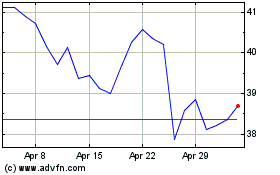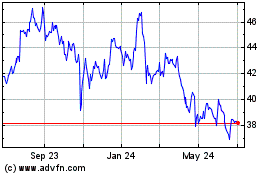By Shalini Ramachandran And Lukas I. Alpert
Steve Burke, chief executive of Comcast Corp.'s NBCUniversal,
stood in front of his senior executive team earlier this year and
gave them a directive: the media giant needs to go where the
eyeballs are going, he said, and get more "digital" into its
DNA.
A few months later NBCUniversal has made some headway in
realizing those ambitions. The company on Tuesday said it agreed to
invest $200 million in BuzzFeed in a deal that people familiar with
the situation say values the new-media company at $1.5 billion. The
pact comes a week after NBCUniversal said it would invest the same
amount in BuzzFeed competitor Vox Media.
The deals give NBCUniversal more exposure to sites that offer a
combination of news, lists and advertiser-sponsored content, and
specialize in reaching the young audiences that are increasingly
fleeing traditional TV. NBCUniversal sees potential to partner with
BuzzFeed and Vox on everything from advertising to creating
television programming to appeal to younger viewers, people
familiar with the deal say.
For BuzzFeed, the investment would allow the company "to grow
and invest without pressure to chase short-term revenue or rush an
IPO," Chief Executive Jonah Peretti said in a memo to staff. In
2014, the company said it had taken in over $100 million in
revenue.
In an interview, Mr. Peretti said there could be many potential
strategic partnerships for the companies, including allowing
marketers to promote across NBCUniversal properties and BuzzFeed.
And he said the resources will help BuzzFeed expand into television
and film, which he estimates will only make up about 10% to 20% of
BuzzFeed's business long term but require bigger content
investments than online media.
"The cost structure of traditional media is much higher--the
cost to make a movie or show is higher," he said, adding that even
though BuzzFeed aims to improve on the efficiency of Hollywood's
traditional model, "it's still going to take significant
investment."
On Monday, BuzzFeed also announced that it had signed a joint
venture deal with Yahoo Japan to create a local Japanese-language
version of the site. Japan would be the ninth foreign market
BuzzFeed has expanded into and the company says it now gets 45% of
its traffic from abroad.
Many media industry observers have been expecting for the past
year to see big mergers among TV channel owners to deal with
mounting pressures in the pay TV world. But so far no such
blockbuster transactions have happened. Instead, several media
companies appear to be directing their capital--at least for the
moment--into digital media companies that hold the promise of
powering future growth.
Unlike the venture investments traditional giants have made for
years, these are sizable bets. Time Warner Inc.'s Turner cable unit
paid nearly $200 million for a majority stake in Web TV tech vendor
iStreamPlanet, saying the deal could help expand Turner's online
video products. 21st Century Fox in July invested $150 million in
sports fantasy startup DraftKings Inc., which is attracting the
coveted demographic of young men.
Last year, A+E Networks, which is jointly owned by Walt Disney
Co. and Hearst Corp., invested $250 million in Vice Media and has
since sought to rebrand one of its channels as a Vice channel.
As for Comcast, the company in April abandoned a $45.2 billion
bid to buy Time Warner Cable after strong pushback in Washington.
Since then, its entertainment arm, NBCUniversal, has been actively
scouting for digital media deals, including with Vice Media, AOL's
Huffington Post, BuzzFeed and Vox Media, people familiar with the
situation say. The company decided to move ahead with the
investments in BuzzFeed and Vox.
NBCUniversal, which owns channels such as USA, Bravo, E! and
MSNBC, has struggled like other media companies to maintain a
connection with young viewers, who have increasingly dropped their
cable connections in favor of watching video online. According to a
Horizon Media analysis of Nielsen data, only about a quarter of
people ages 18 to 34 watch prime-time TV, compared with 53.1% of
those over 55.
More than half of BuzzFeed's 82.4 million unique visitors in
July were between the ages of 18 and 34, according to comScore Inc.
Vox Media, which is made up of eight websites focused on sports,
politics, food, fashion and technology, had a combined 54.4 million
unique visitors in July, with more than 40% between the ages of 18
and 34.
One potential area of partnership with BuzzFeed is the Olympics,
which NBC telecasts. For a big television feature on a key Olympic
swimmer, for example, BuzzFeed could create promotional videos of
younger Olympic swimmers that could help generate interest among
younger viewers for the television broadcast and bring in ad
dollars, the person familiar with NBCU's thinking said. In
addition, some popular BuzzFeed shows such as "The Try Guys" --a
show where a few men try outlandish acts such as walking a mile
with fake pregnant bellies--could get picked up as a television
show or segment on an NBCU channel, the person said.
In advertising, NBCU could join forces with Vox and BuzzFeed to
package together younger audiences for advertisers to target. NBCU
could offer a marketer a chance to buy ads across its cable
channels Bravo and E! as well as BuzzFeed and Vox to reach a
particular demographic, for instance, the person said. NBCU's news
properties also hope to learn from BuzzFeed's expertise in making
stories and videos go viral.
Before the NBCUniversal investment, BuzzFeed had raised $96.3
million in five investment rounds. Last year, it raised $50 million
from venture-capital firm Andreessen Horowitz, valuing the company
at $850 million.
As part of the deals, NBCU will likely have a seat on the boards
of each company, according to a person familiar with the
transactions, which will give the media giant a voice in the
startups' strategic direction.
Amol Sharma contributed to this article.
Write to Shalini Ramachandran at shalini.ramachandran@wsj.com
and Lukas I. Alpert at lukas.alpert@wsj.com
Subscribe to WSJ: http://online.wsj.com?mod=djnwires
(END) Dow Jones Newswires
August 18, 2015 16:05 ET (20:05 GMT)
Copyright (c) 2015 Dow Jones & Company, Inc.
Comcast (NASDAQ:CMCSA)
Historical Stock Chart
From Mar 2024 to Apr 2024

Comcast (NASDAQ:CMCSA)
Historical Stock Chart
From Apr 2023 to Apr 2024
